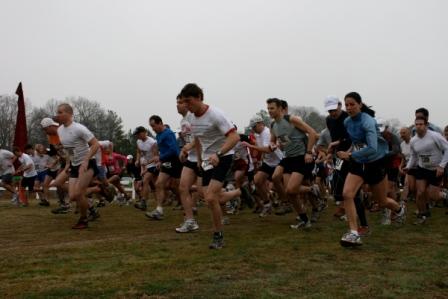How do you gain confidence? Positive reinforcement. But you can’t wait for others to give it to you. You have to give positive reinforcement to yourself. For instance, I start every day by looking myself in the mirror and saying, “You’re an amazing blogger, you’re a maven, you’re a connector, you’re an inspiration to the masses, you’re the boss, you’re The Real Chris Barber…this is kind of weird looking straight into my own eyes in the mirror. I do look pretty hot though. Is that a pimple?…” You get the idea. This technique builds your mental confidence. It tells your mind what it should think you are capable of. I tell my mind that I can do anything and I truly feel that way. Why do you think men do half of the crazy things they do. Because someone said we couldn’t do it. Mental toughness is a very important part of running and I attribute it to 95% of my running success. I’ve discussed the importance of mental toughness and confidence before though, now it’s time to work on your physical confidence. It’s time to catch your body up to your mind. Your physical confidence is kind of like a mental governor. I know governors are for losers. I like to grip and rip as much as the next guy, but in order to perform at your maximum potential you need to pace yourself. Like you, I’ve never reacted kindly to being told to, “Pace myself” either, but it’s cool when you are talking about running.
Physical confidence isn’t the way you walk into a room. That’s all mental baby. It’s what your body thinks it can do. You’re body has an idea of your strengths and weaknesses and regulates your physical outputs based on this historical information. Your physical confidence is always a more accurate representation of what you really can accomplish. Your mental confidence is the one that says, “I could probably throw this football over that mountain.” But your brain takes into account what your body is actually capable of instead of what you have arbitrarily told yourself you can do. Your brain is constantly getting inputs from parts of the body, then interpreting these, which it then alters exercise intensity by changing the degree of muscles activation to either slow or speed up. Your brain is developing your pacing strategy based on its physical confidence. It is allowing you to output as much energy as possible while still getting you to the endpoint of the race. This is sometimes referred to as anticipatory regulation. So how do you loosen the restrictor plate off the Red Dragon? You don’t want be exactly street legal do you? What’s up Mike?!
You build your physical confidence by giving your brain some strong past experiences to draw from when it determines how much of your output it should regulate. Loosen that restrictor plate baby. This is why many training plans call for intervals at race pace. It gives your body physical confidence that it can run that particular pace, for a long distance. But you don’t want to just attain your goal, you want to crush it. One way to do that is to run one ridiculously difficult work-out before your race. Run one absurdly hard training day that you don’t even have 100% mental confidence in doing. Give your brain something to derive its physical confidence from. A good way to do this is to run an interval work out, totaling the distance of the race you are training for, at a 15% pace faster than your race pace. Push your body to its limits. This will without a doubt give your body the physical confidence it needs to crush your goal. It will also help your mental confidence, giving you a hard work out to “hang your hat on” on race day.
You’re body is like a dog, it learns best from physical reinforcement. So push your body to the limit and wear them dogs out.
But you can still keep looking the mirror because, “You’re special. There is nobody in the World like you. You’re smart because you read SeriousRunning.com blog.” Go ahead. Keep telling yourself that.
